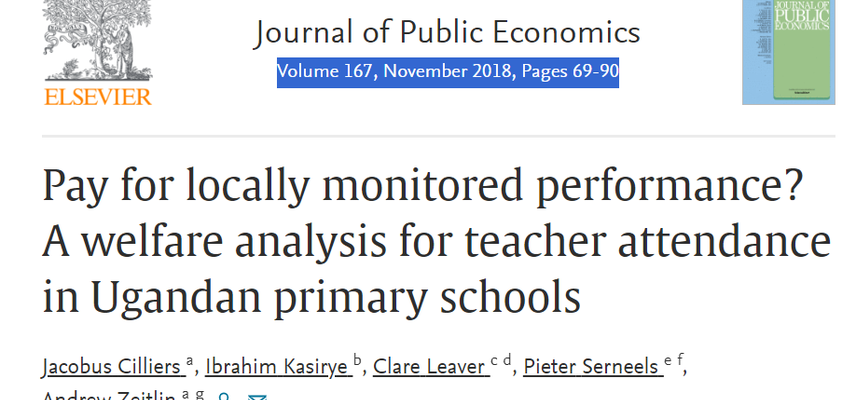LOCAL MONITORING OF TEACHER PERFORMANCE IN UGANDAN PRIMARY SCHOOLS
OUR AIMS
Teacher absenteeism remains a serious challenge in Uganda, with estimated rates of absence as high as 27 per cent. Evidence from other countries suggests that a monitoring scheme, combined with bonus payments, could reduce absenteeism, and improve education performance. However, it is unclear what form this scheme should take.
This project examines if local monitoring of teacher attendance by headteachers and/or parents can improve teacher performance and student learning? Does it pay to pay for locally monitored performance?
ABOUT THE PROJECT
To achieve the twin objectives of incentivising agent performance and providing information for planning purposes, public sector organisations often rely on reports by local monitors that are costly to verify. Received wisdom has it that attaching financial incentives to these reports will result in collusion and undermine both objectives.
But simple bargaining logic suggests the reverse: pay for locally monitored performance could incentivise desired behaviour and improve information. To investigate this issue, the team conducted a randomised controlled trial in 180 Ugandan primary schools to explore how incentives for teachers could be designed when based on local monitoring by school stakeholders.
RESULTS
In the first part of our experiment the team focused on pay, randomly varying whether headteachers' reports of teacher attendance were tied to teacher bonus payments or not. The researchers found that local monitoring on its own is ineffective at improving teacher attendance. However, the introduction of bonus-pay leads to both an increase in teacher attendance---by 8 percentage points---and an improvement in the quality of information. The team also observed substantial gains in pupil enrolment, driven primarily by a reduction in dropouts. By placing a financial value on these enrollment gains, the researchers demonstrate that pay for locally monitored performance passes both welfare and fiscal sustainability tests. I
n the second part of the experiment the team fixed bonus payments in place and explored community participation, randomly varying whether local monitoring was conducted by headteachers, parents, or both. Here they found that parents on their own do not make for better local monitors than headteachers---teacher attendance is no higher, and the quality of information is lower, even though the cost in terms of bonus payments is the same. However, parents do make for good auditors---benefits were highest and costs lowest in the study arm where parental audits verifying a headteachers’ reports were needed to trigger teacher bonus-pay











